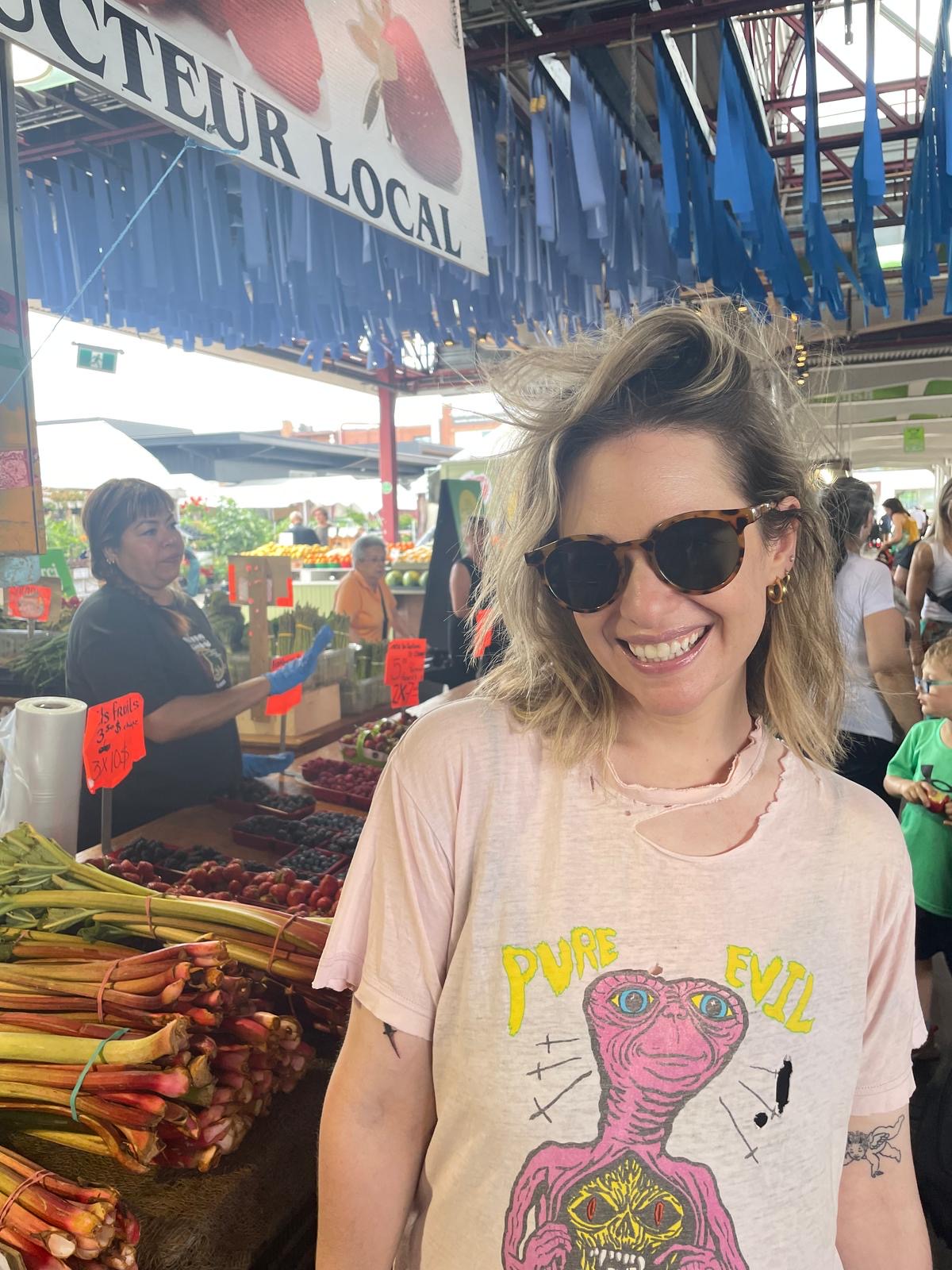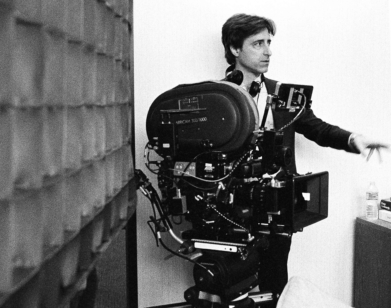IN CONVERSATION
Haley Mlotek and Jia Tolentino on Gossip, Longing, and Literary Love Stories
To get this out of the way, I’m wildly biased when it comes to Haley Mlotek. I’ve been enamored of her since we first met over a decade ago, when she and Jazmine Hughes took over the editorship of the dearly, monstrously departed website The Hairpin from Emma Carmichael and me. Our friendship since then appears in my brain as a montage of easy intimacy capacious enough to blunt all personal or professional crises: dive bar backyards, stoned laughing fits on a couch, the woods upstate, movie theaters, conspiratorial wine. Along the way there were crushes and babies and breakups, workplaces organized successfully (on her part) or unsuccessfully (mine), endless brilliant subject-writer-publication pairings from Haley’s editor brain (recently: Daphne Merkin on the erotics of unhappiness for A F*cking Magazine, commissioned with her co-editor Maria Dimitrova), pieces of beautiful criticism (I love this on Deborah Levy), late-summer discontent later rendered into gems.
Being with Haley has a peculiar and magical effect: you feel that you’ve never understood the world or the self more clearly, a sense undergirded by your renewed realization that you don’t understand the world or the self at all. Her reverence for both the particular and unassimilable, on full display in her new book, No Fault: A Memoir of Romance and Divorce, is part of what compels a person to be her reader, her friend, her fan. Here we talked about slow yearning, the sacredness of gossip, the unappetizing nature of the word “hubby,” Diane Lane’s hair color in Under the Tuscan Sun, and, of course, Haley’s wondrous book.
———
JIA TOLENTINO: Haley, when is the book actually out?
HALEY MLOTEK: February 18th.
TOLENTINO: Are you doing a shit ton of promo right now? How do you feel?
MLOTEK: I feel okay. If this is in the interview, we can put in brackets, “hesitantly.”
TOLENTINO: That’s as good as it can be, I think.
MLOTEK: Right? I’ve never felt this particular type of extremely nervous excitement. Just today I had a moment of dreading the 18th, but then I was like, “No, that’s what I’m looking forward to the most.”
TOLENTINO: Are you having a party?
MLOTEK: I don’t know, actually. Will you help me decide?
TOLENTINO: I think you should. I was thinking about the first time I met you, and I went into my Gmail and found out exactly when it was. Do you remember when we met?
MLOTEK: I think so. I’m pretty sure we’re thinking of the same meeting.
TOLENTINO: When you were with Jazmine?
MLOTEK: Yes. It was right after you and Emma left The Hairpin, and we had just started at The Hairpin. October 2015—is that right?
TOLENTINO: Oh my god. It was October 7th, 2014. That’s crazy you remember. Yeah, we went to Mother’s Ruin. You were wearing your leather jacket over your shoulders and you had bleached hair. I found you very hot and cool and mysterious.
MLOTEK: Stop. No. That’s you you’re talking about.
TOLENTINO: No one has ever described me as mysterious in my life, and that’s why we’re friends. But if you can remember that from 11 years ago, what do you remember feeling about what it was that we were all doing there? The internet, personal writing, excavating the world through excavating the self. What did the whole project feel like to you then?
MLOTEK: This is an interesting thing to consider because it’s so difficult to separate how I look back on that time with how I probably felt about it then. I think I had a funny combination of feeling very uncertain about what I was doing at The Hairpin and what the Hairpin should be—
TOLENTINO: Really?
MLOTEK: Yeah, because that was my first paid media job. Oh my gosh. We are so old. From the outside, it looked like it was so well-defined. You and Emma had made The Hairpin its own thing, and then there was this whole cohort of other similar digital publications. But when it was my turn to actually think about what Jazmine and I were going to do with The Hairpin, I felt really at a loss. The only thing that I was sure about was that, given the people who were involved as contributors and previous editors, it would naturally find a voice for itself. I do think that’s something that has stayed with me. I often default to not relying on a house tone when I’m editing, just thinking about a writer’s voice first, and that seems very Hairpin-y.
TOLENTINO: Yeah. I remember feeling like, “I don’t know what I’m doing, but this is fun.” Now I look back and I’m like, “Actually, that was the perfect job.” Also, the fact that there was this collective illusion that, I don’t know, all of it would add up to something other than what has been bulldozed into the AI swamp. Who are the writers in your stable that you’re still the most proud of?
MLOTEK: I don’t even know how to narrow it down. Because the other thing that I should point out, which I think we’ve talked about before, is the reason it had that feeling of adding up to something is because all those blogs were part of a media ecosystem that’s also evaporated into an AI-billionaire conglomerate swamp. I definitely took a lot of pride in knowing that editors at the more established institutions were trolling The Hairpin looking for people. Some of Anna Fitzpatrick’s essays for The Hairpin were so funny, and I know they directly led to her getting published in The New Yorker’s humor section for the first time. I remember being really proud of publishing Emma Healey’s essay, “Stories Like Passwords.” It’s funny, I’m gravitating towards the more emotional, heartfelt personal essays, which I guess shows where my instincts lie.
TOLENTINO: I was always on that side of it, too.
MLOTEK: I remember when Jaya Saxena and Jazmine tested out all the beauty products that had placenta in them—I loved that. I loved Marie Lodi’s [column] Bloodfeast.
TOLENTINO: That was really good. Jamie Keiles was there, right?
MLOTEK: Yes, that’s right. Jamie was writing for The Hairpin and The Awl at the time. I remember he would often come to the office to co-work with us, even after Jazmine left. That’s a nice memory.
TOLENTINO: In the weird Brooklyn office or the Manhattan one?
MLOTEK: The Brooklyn one.
TOLENTINO: I only went a couple times, but I remember there was a Roomba there.
MLOTEK: There was a landline.
TOLENTINO: So you were married in 2014?
MLOTEK: Yes, December 2014.
TOLENTINO: I’m going to go straight to the part of your book that has been very important to all of your friends, which is this devastating part where you say, “Because I don’t tell stories, everyone thinks I have secrets.… As a result, my friends and I are alike, in that we both had no idea why my marriage ended. We are different in that they think they can find the answer, and I know I never will.” Later, you say, “The only person we can reliably keep a secret from is ourselves.” For the record, I don’t think you’re secretive. More I think you’re subtle and discreet to a degree that none of the rest of us are, but I want to ask you what you meant when you wrote that. Did you mean that presumably there could be an answer to this question that would satisfy those who knew you and put the question away, but there would not be a version of that answer for yourself? Tell me about that.
MLOTEK: Yes, that’s definitely part of it. I think, too, what I was alluding to is that I probably would never be the person who would provide the answer that I even believed or agreed on. As you know all too well, if I don’t know what to say, my default is to just say nothing.
TOLENTINO: Well, you are well-known for being one of the easiest people to tell difficult private things to. I was trying to think, like, “Why is Haley so good to tell secrets to?” I think it’s because you are, as a person, interested in intimate personal information. But also, because I think you’d be the first to say, “Whatever this is, it’s none of my business.” People also tell me things, and I mostly hold onto them, but not to the vault-like extent that you do. I know that if I tell you something, you won’t give it to someone else to be misinterpreted. You understand how quickly one side of the story can twist the facts of reality, and I just have this sense that you will not be a part of further mangling facts that are instantly mangled anyway.
MLOTEK: Maybe. I mean, I hope that’s true. But as I write in the book, I just love gossip. I do have a reverence for gossip, where I respect it very much and I don’t take it lightly. Because I learned how to be a writer and an editor on the job and I felt insecure about not being a “real” journalist, sometimes I go way too hard on some of the ethics that I’ve learned from other journalists. I wonder if maybe I apply that to personal conversations as well, which I hope makes me trustworthy. But I have wondered what it is about me that makes people want to tell me these things.
TOLENTINO: What are the other reasons you’ve come up with?
MLOTEK: I have wondered if it’s genetic, because people used to do it to my grandmother; they do it to my mother; they do it to my sisters. We all just get sucked into conversations. It’s probably because we’re patient and will listen for longer than maybe a reasonable person would. But it’s very funny, because after I started working on the book about divorce, something that would happen frequently is people would immediately want to tell me everything about their divorce in just normal small talk.
TOLENTINO: There’s also a sense that you will not impose the easiest narrative on something ever.
MLOTEK: To my detriment.
TOLENTINO: So, what are the divorce tropes that you were writing this book—not necessarily in opposition to—but as an alternative to?
MLOTEK: There are definitely so many divorce tropes, and then there are these divorce expectations about how people in these situations will behave or what it is that they should teach us. I also write a little bit about television in the 90s and early 2000s as a cultural force, looking at the really contradictory messages that the media sends in general. You have a lot of the classic fearmongering, which is: once you’re divorced it’s very difficult to remarry. Or, if you’re a woman, as you age no one will want you. Then there’s also the stigma of being a failure, which is genderless but applies differently depending on your gender identity. I also quote Lauren Berlant’s Cruel Optimism where the other trope is this need to make the divorce useful or positive.
TOLENTINO: Under the Tuscan Sun or whatever?
MLOTEK: Exactly, which I obviously love. I’m not above it.
TOLENTINO: I remember when you got that precise hair color. You were sitting on the couch like, “I think I’m going to do this.” The next day, you had it.
MLOTEK: Diane Lane, she knows what she’s doing. I mean, I know why it’s so compelling as a story, because it does tie things up very neatly. It’s funny that I write so much about Elizabeth Gilbert, because as a person, she is a great example of how quickly those tropes fail us. She’s written quite a bit about her life after that very romantic ending that’s been immortalized in a Julia Roberts movie is not how the rest of her life went. I guess if I was writing against anything, I was trying to express that life is really long. This is a divorce that happened when I was very young, or relatively young.
TOLENTINO: Very young. We can say that.
MLOTEK: There’s this real sense that life ends at 30, or something like that. But seeing more examples of how life is constantly cycling through these different stages is what I hope my book contributes to.
TOLENTINO: This isn’t a millennial divorce book by any means, but one of the things I’ve found the most interesting about this project is, what does divorce mean to a person or a cohort to whom marriage is not sacred? You got married for a visa; I got married exclusively for health insurance, and it is what it is. I don’t think either of us have any sacred cow feeling towards marriage whatsoever, and yet we do towards love. The institutions don’t mean so much, but we still desperately want to be loved and love people. We are dealing with all these impulses at once. What is the ricocheting of that meaning?
MLOTEK: I wish I knew, but it’s obviously something that obsesses me. I wrote a whole book about it. Because you’re so right—in secular cultures, marriage does not have the same hold. But I do sense that there’s this idea of love being so revered and sacred that it corrupts it when we start talking about it under the institutionalized benefits of a love match. So many people feel like it’s ethically wrong for things that are basically rights to be held hostage for people who have a marriage license. Rents are stabilized and tenants have rights and healthcare rates go down. That’s not to say that the consuming question of it goes away, but I wonder if our rejection of the institution has less to do with the institution itself and more so the feeling that love can’t risk being inside this institution. Of course, I write about this in the book, but that’s exactly what the Victorians were like: “Keep marriage a business arrangement.” Nobody was saying, “You can’t fall in love,” or “You can’t have romance.” I don’t think it ruins love. But on the other hand, I’m single, so what do I know?
TOLENTINO: I polled some people to be like, “What are questions I should ask Haley?”
MLOTEK: No.
TOLENTINO: One of them said, “What are the qualities that would appear in your dream man?” So I’m going to ask you that.
MLOTEK: Who wants to know?
TOLENTINO: I’ll tell you that later.
MLOTEK: Okay, this is a good question. I do tend to be very attracted to people who have a lot going on, socially and creatively. I love to see somebody who has a lot of friends and feels like a very central part of their community. That’s always a positive for me.
TOLENTINO: Hot, of course. I just want to put that on the record.
MLOTEK: Oh, yeah. We should have started there. What am I doing talking about personality first? Obviously, I want somebody hot.
TOLENTINO: So hot.
MLOTEK: Choking on my lust in my field of vision. But as you know, I have a very elusive definition of hot. I won’t say anything like hair color. Just the effect it has on me, that’s the hotness I’m looking for. But it should be somebody that I can bring around my inquisitive friends and who takes their questions with a lot of good humor. I do always love that feeling of meeting somebody new and wanting to know everything about them and having that back and forth. So, I guess somebody who’s curious and attentive and nice. And likes me.
TOLENTINO: Great answer. This is the last of the serious questions, I think. I’m interested in the way your writing contains this continual motion of precision and elusiveness battling each other. Like, reality is always slipping away from the pins that you’re sticking on the wall. You wrote, “I mean, I was married and now I’m not. And when I consider either state, I worry. It seems more like trying to describe a dream I never had. The words are the only way to explain, and I need to say what happened, but when I do I lose the man in the marriage for the first time and all over again.” This is one of the things I love the most about the book. It’s asking these questions: is marriage a reasonable container for love? Is divorce a reasonable shorthand for the rupture of it? Can words contain reality? It’s like you’ve established that there is a space between the truth and what really happened. You’re more conscious of that space than anyone I know.
MLOTEK: I love the way you put it. I will say, also, something that I only realized at the very end of the process is how much writing in the book is from the actual time when I was getting divorced. It’s not everything, and I won’t even say it’s the majority. But the passages that have been pointed out to me as especially resonating with people were all some of the earliest writing I did. Something about writing immediately made me extra aware that, of course, all I had was my perspective. I was the least trustworthy perspective on the topic because it was about me.
TOLENTINO: You mentioned you kept a notebook around that time.
MLOTEK: Yes.
TOLENTINO: But are you not typically a notebook keeper?
MLOTEK: I’m not. I have never been a consistent one. There have been periods where I kept a journal, and sometimes I’ll force myself to write by hand to just slow down my thinking. I take notes obsessively for my day job, in order to remember things. But for writing, no. The only thing I consistently do is leave reminders for myself in the Notes app. That happens frequently when I’m on the subway or taking long walks. I’ll be like, “Oh, that’s a sentence.” But that’s the closest I come to being a notebook person.
TOLENTINO: So you’re a Notes app person. You joked that this article should be titled “Jia’s Revenge,” ‘cause you interviewed me for SSENSE, right before my book was coming out, and we were just hanging out on my couch and smoking weed. I had a moment in the middle of it where I was like, “Oh, fuck.” You realize that you’ve entered into this weird book promotion framework where you’re answering things as if you know things.
MLOTEK: I sometimes am able to access that, very direct and to the response. But as you can see, I’m just as discursive in speaking as I am in writing.
TOLENTINO: Well, here’s “Jia’s Revenge,” where I went to a select group chat and said, “What should I ask Haley on the record?”
MLOTEK: I love it.
TOLENTINO: Number one is the worst one. Why did you get divorced?
MLOTEK: Well, Jia, I don’t know. I have an answer that’s more for my therapist. I have an answer for the book that’s closer to a friend answer, which is that I do not think it was right to marry for a practical reason. It did actually change something for me. Perhaps I had a lot more baggage around the label than I realized, and it was my Saturn return. That’s my blip answer, but there were a lot of reasons.
TOLENTINO: Another question, what are the most and least Canadian things you’ve ever done?
MLOTEK: Most Canadian? I guess moving to Montreal. And I do really pay attention to how many Shoppers Drug Mart optimum points I’m collecting, which is our big chain of evil pharmacies. I will go out of my way to go to a Shoppers to buy my Maybelline Great Lash Mascara to get the points. The least Canadian thing? Since I moved to Canada, the funny thing is I’ve noticed that I’m much more capable of having difficult conversations. That’s probably because—
TOLENTINO: You’ve got some New York in you.
MLOTEK: Yeah, I brought it back. I definitely used to be somebody who really avoided any type of conflict, and that included any sort of friction or tension. So it’s nice now that I feel like I have friendships where, when that happens, we can talk about it directly. As you know, I’m a Cancer. I’ll just look you in the eye and be like, “Let’s talk about this.”
TOLENTINO: When’s your birthday again?
MLOTEK: July 3rd.
TOLENTINO: Last one, what is the smallest thing you’ve ever put your tiny hands into?
MLOTEK: This is a ridiculous question. Who asked this?
TOLENTINO: I don’t know. What would you compare the size of your fist to? A small apple?
MLOTEK: Yeah. I literally have an apple in my fruit bowl right now. I’m looking at it.
TOLENTINO: For the record, Haley has tiny little hands.
MLOTEK: They are tiny.
TOLENTINO: Tiny, beautiful, cute hands. Okay, back to my questions. The word “romance” is in the subtitle of your book, and I want to say for the record that you wrote the subtitle for my book.
MLOTEK: Oh, yes.
TOLENTINO: I feel like a lot of the conversation about your book has probably been about the divorce aspect—and, understandably, that is the under-plumbed subject that you step into here. But I want to talk about romance. Can you free-associate the most romantic things in the world to you? What is romance?
MLOTEK: This is going to be so revealing, because the first thing in my mind was yearning. All forms of longing. And definitely a healthy amount of uncertainty or nervousness or hesitation. Moving very slowly and carefully, but needing to move things forward.
TOLENTINO: What about seasons, objects, places?
MLOTEK: Like everybody, I think fall and spring are probably the most romantic. Maybe because it’s winter, I’m thinking of softness and closeness and quality time. But those aren’t really objects.
TOLENTINO: So you’re thinking about blankets, sheets, beds. Which is a more romantic city, New York or Montreal?
MLOTEK: I’m sorry, but it’s Montreal.
TOLENTINO: What are things that are filed under romance that are unromantic to you?
MLOTEK: Definitely marriage proposals. But I do love weddings—
TOLENTINO: I love weddings, too.
MLOTEK: If they’re done right. Similarly, actually, the concept of date nights I find very unromantic. But I love going on dates.
TOLENTINO: Totally. Date nights have the flavor of the word “hubby.”
MLOTEK: Exactly. Maybe it’s anything that seems too rigid to me. With marriage proposals, it’s like, “Well, it has to go like this.” With date night, it’s like, “Well, it has to be on this day.” That definitely is a boner killer.
TOLENTINO: Did you ever read Forbidden Notebook? The notebook question that made me think of it.
MLOTEK: I don’t think so.
TOLENTINO: Well, did I ever talk to you about how I went insane a little bit after reading it?
MLOTEK: Oh?
TOLENTINO: It’s by Alba de Céspedes, and it’s an older Italian novel about a woman confined within a marriage and domesticity and children. She starts keeping a notebook because she’s feeling trapped. You expect this woman to become liberated by articulating herself to herself. Instead, it traps her more.
MLOTEK: Yeah, I get that. This is my book. Again, this is a question for a therapist, but that might have something to do with why writing is the medium I’ve chosen. There’s something really, I don’t know, impossible about how much it contains you and this desire to write your way out of that container. I don’t know if you can. I think, if you can, it’s probably not for the writer, it’s for the reader.
TOLENTINO: I thought, by writing a novel about this, the author was replicating the experience of the protagonist. You think it’s going to be liberatory, and instead you are re-inscribing the reality of the situation. The character writes “The better I know myself, the more lost I become.” I had a powerful reaction to it. Afterward I was like, “I’m not reading any fiction about women for six months.”
MLOTEK: That’s enough women for now.
TOLENTINO: Agreed. What are the books that we both agree are the best books? Sleepless Nights [by Elizabeth Hardwick], Parallel Lives [by Phyllis Rose]. We were both obsessed with Loved and Missed [by Susie Boyt].
MLOTEK: I think I know which Edith Wharton it would be. I was going to say Age of Innocence, but that just shows—
TOLENTINO: I’ve been wanting to reread it.
MLOTEK: I always think of that and Portrait of a Lady, Henry James.
TOLENTINO: Perfect.
MLOTEK: Those are my definitions of romance. I’m just obsessed.
TOLENTINO: Well, we talked about this with Loved and Missed. It wasn’t romance per se, but I thought it was one of the most shockingly true books about love that I’d ever read. What are the other books, in terms of literary romance?
MLOTEK: Well, I always go back to the fact that one time a friend who was going through a breakup wanted to borrow my copy of Days of Abandonment, Elena Ferrante, and I said, “No, come back for it in a few months.” And I stand by that. It was too powerful.
TOLENTINO: I feel like we had a freak-out about that.
MLOTEK: Oh, and you know another romance that’s almost in the vein of Susie Boyt is Family Lexicon by Natalia Ginzburg.
TOLENTINO: Yeah. We’ve never talked about that book, but wow.
MLOTEK: It’s so good. It’s the same feeling of affection and warmth and true love across a family. For Natalia Ginzburg, as well, she has this very tragic story about her first husband.
TOLENTINO: My last question for you is, if we were going to go to Walter’s right after this, what would you get?
MLOTEK: I’m telling on myself again. I would probably get the kale caesar salad with grilled chicken and maybe a little glass of orange wine. What would you get?
TOLENTINO: I would get a little glass of red wine. I feel like I always get an app and then the same salad.
MLOTEK: That’s perfect. No notes.







